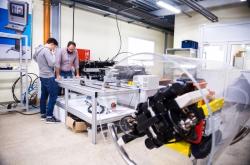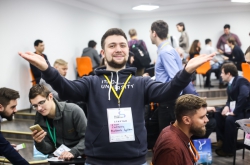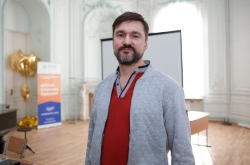ITMO University has started to develop unique “entrepreneurial” Master’s programs. Its “Innovative Entrepreneurship” program aims to give its students essential entrepreneurial skills. Why has it become so relevant?
We are currently witnessing a fairly tough time for the economy: profits fall, and there’s a threat of a worldwide slump after the recent long period of growth. Such a situation is optimal for getting new knowledge, so I recommend everyone to study during such declines. And what you need to study are things that will be sought-after in the future.
We see that many branches of the industry are going through a digital transformation and automation, many professions bite the dust, and the ways of managing employees and companies also change. In such conditions, it is self-sufficiency, as well as entrepreneurial attitude and competencies, that become highly relevant. Enterprises start looking for people who possess these qualities; also, such qualities prompt people to feel more confident about starting their own business.
Anyway, the best time to launch your business is in a period of growth. And now is the right moment to get a systemic education in order to catch the next wave.
Why would future or current entrepreneurs need to take a Master’s program and get systemic education in this field? What is it that makes it different from short-term courses?
When we were reconsidering our programs’ focus, I thought it very important that we make the “Innovative Entrepreneurship” program different from other types of programs.
By all means, there exist MBA programs that train managers for major companies. As a rule, those are general-purpose specialists who can work in any industry and have a particular set of ways for working with HR management, interacting with the authorities, and so on.
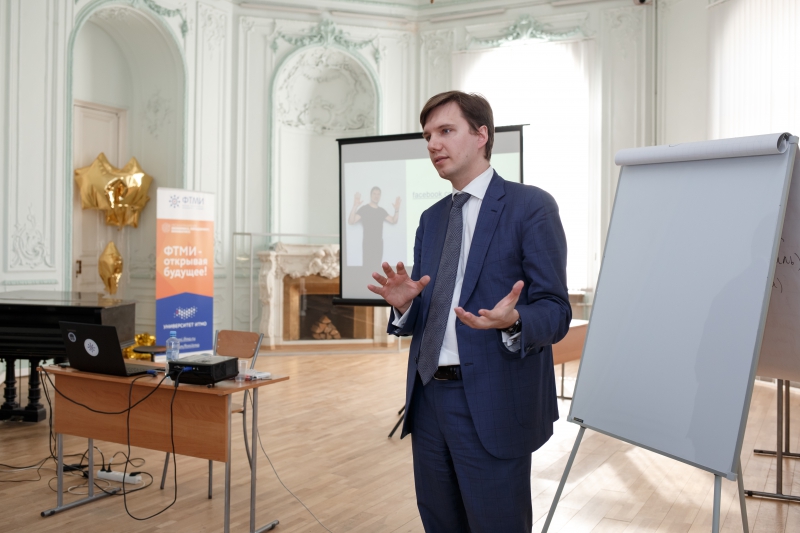
Another type of programs is short accelerated programs aimed at training particular skills at a very high pace. At such programs, you can learn to, say, manage an advertising company, develop marketing strategies, or establish sales channels, in some couple of months. These skills are definitely useful, but they don’t have much to do with complex processes.
Business is becoming more and more complex, and if you want to launch a company that will survive for a long time, or even revolutionize its field, and not just some “Uber, but for laundry”, you need really advanced knowledge. As part of the “Innovate Entrepreneurship” Master’s program, ITMO University and its Faculty of Technological Management and Innovations follow a systemic approach, which allows us to offer such knowledge and competencies.
What competencies exactly will the program’s students acquire?
First of all, one has to understand that an entrepreneur or a manager always has to deal with limited resources; they never operate in ideal conditions. Anyone can constantly complain that they have a bad team or a bad business model, lack funds to spend on marketing, and so on. All of that should be completely irrelevant to an entrepreneur. Entrepreneurs work with the resources they have, and turn them into many-fold profits. The ability to create value is a skill most prized which you can actually master by understanding and learning its elements, studying the associated techniques, and applying them in your individual project during the two years of our program.
Secondly, today it’s not only important to have the knowledge of the new ways of organizing people’s work, like the Lean Startup method or some other technique that you can learn at short-term programs. Today, you need a keen knowledge of fundamental technologies.
If you’re planning to work on a complex project, you won’t do without data science, Big Data, automation, you’ll need to understand such fields as new materials and biotechnology. All of that is currently applied in the key sectors of innovative economy. Biotechnology, for one, is applied in not just the healthcare sector, but also in such areas as AgroTech, FoodTech, CleanTech, recycling, transport and even ICT where they use it to create all kinds of biosensors. This is what working with cutting-edge technologies, which is essential in today’s conditions, is about.
For this reason, we’ve included the option to get a double major at our program: a special certificate that our graduates will get at one of ITMO’s Schools that focus on fundamental technologies. This will let them be up-to-date on what modern biotechnology, microbiology and, say, the concepts of biotech production are all about. And that is only one of the examples of how the modules of our program are organized.
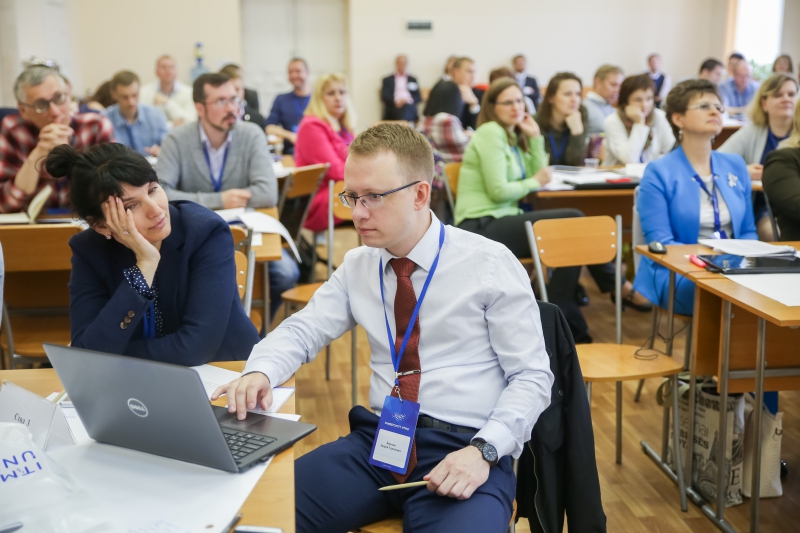
Can you tell us more about what will the students’ practical training be like?
By all means, understanding the fundamental technologies is not the only thing that’s important. All students at the Faculty of Technological Management and Innovations have to “get their hands dirty”. This means that as part of their education, they have to complete their own projects. For this purpose, we have our so-called “live laboratory”, which provides them with technical experience in various fields.
At ITMO University, we have a world-class Engineering center for printed electronics, so our students can print their first solar panels with their own hands. You see, one thing is when a student studies solar engineering by textbooks only; having the opportunity to try these technologies in practice offers a completely different level of competencies that can really help them during job interviews or when pitching their projects to investors. And this is a level of confidence that we want our students to have.
From your experience, what are the competencies that modern entrepreneurs lack most? And how do you solve this issue at the new program?
Back to the topic of competencies, one of the key aspects that many entrepreneurs have problems with is industry-specific regulation. For some reason, most think something like: “I’ve come up with a great business model, and now we’ll quickly introduce it and get our first million”. Then, they start working on the details, and face the fact that the branch they want to work in is regulated in a particular way and everything they’ve come up with is either technically impossible or extremely expensive.
Today, if you are going to launch your own business or even more so work for a corporation, regulation is among the most important concerns. The issues of cybersecurity, working with personal data, certification of food products, working with state procurement or in the field of alternative energy are all strictly regulated. The associated processes are highly complex, and it’s impossible to learn all of their aspects at short-term courses.
The most important thing is to have a keen knowledge of a particular branch of industry. Among other things, it is for that reason that we organize industrial internships to provide our students with an opportunity to gain experience at such major enterprises as BIOCAD or Rusnano. We also help them study the industry-specific regulation of the international markets.
I am an investor, so I often speak to entrepreneurs. Another thing that many of them lack knowledge of are issues related to the field of intellectual property protection. That being said, intellectual property protection is the second key element of any innovation, apart from the technology itself. If you failed to protect your technology, it no longer has any value. So, we give our students the corresponding knowledge in this field, as well.
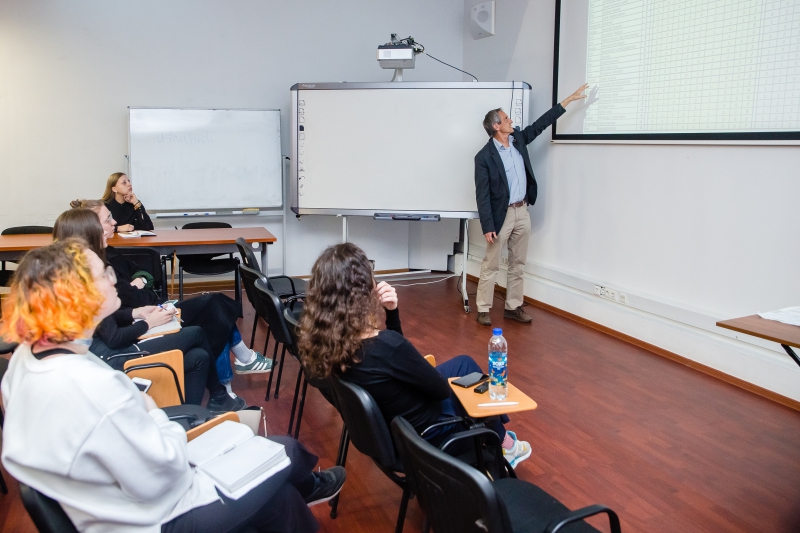
Master’s programs at ITMO University offer their students an opportunity to choose an individual development path. The “Innovative Entrepreneurship” program also has several specializations. How exactly will students be choosing what they really need in terms of training?
When we designed the programs, we first created a map of all the competencies that are essential for being successful in innovative economics. Thanks to that, the structure of our programs covers all the associated skills.
We aim to make it so that our students acquire knowledge and skills that are necessary for building a career at an enterprise or launching one’s own business. The competencies and skills are organized into a matrix that allows our students to choose their individual development paths. The choice is wide: some may want to become executives or entrepreneurs, others — professional lawyers, or see their future in marketing or the field of quality control.
Every program is split into levels, which provide for the freedom of choice. Every time, the students specify which of the five modules they are going to study. Such an approach gives you an opportunity to prove that you have knowledge and skills in biotechnology, new materials, data science, robotics or digital transport once you complete the program.
On the whole, I deemed it important for the programs to be flexible and for the students to have a freedom of choice, on the one hand, and for the students to have the opportunity to gain in-depth knowledge of what they’ve chosen, on the other. The program includes eight specializations that students can choose after the first semester. Having said that, I’d like to note that we plan to cater to a students’ conscious choice or the experience that they already have in their chosen fields. Our task is to give them a specialized set of competencies: you see, the specifics of intellectual property protection in ICT, for example, differ from what you’ll encounter in fields such as biotech or foodtech.
Who will act as lecturers for the program, and do you plan to invite practitioners from companies?
As I’ve already mentioned, the programs at the Faculty of Technological Management and Innovations include systemic knowledge in parts associated with the fundamental concepts of technologies as well as international and local regulations — those that call for the most up-to-date knowledge in the field of technology. For such modules, we’ll be involving leading professors from the academic community.
Then again, if it’s entrepreneurship that we’re talking about, practical experience comes first. This is the reason why we’ll be selecting the so-called masters for every of the “Innovative Entrepreneurship” program’s specializations — associate professors or professors who have successfully launched their own businesses in particular branches of the industry. Such people can speak about the difficulties of launching a business in their true colors, which is the kind of information that can help our students to choose their own path and fulfill their potential.
We’ll also be organizing a large pool of lectures given by opinion shapers and leaders in different fields. One of the experts, for instance, will be Vitaly Nedelskiy, the founder of Semantic Hub and the Russian Association of Robotics (you can read more about Mr. Nedelskiy’s experience in his interview for our portal).
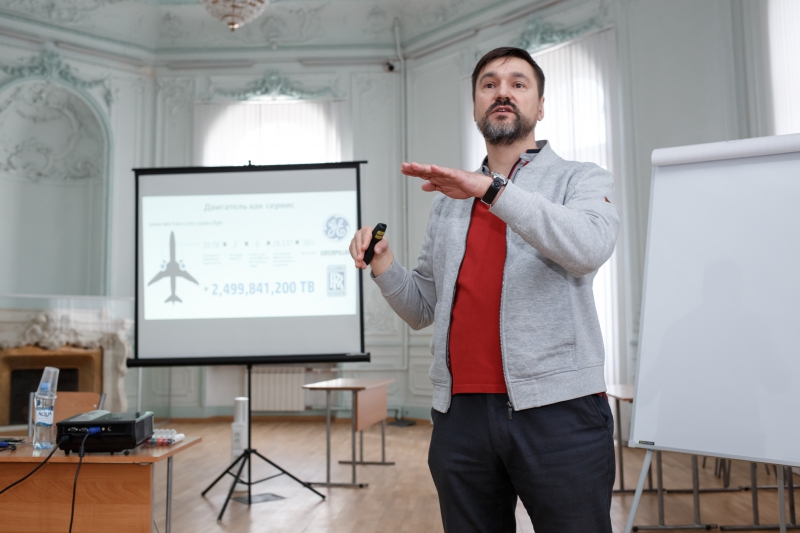
Apart from Vitaly Nedelskiy, the list of the program’s mentors includes such specialists as Dmitry Alexeev, a renowned specialist in the field of FoodTech and LifeSciences. He has developed a breakthrough microbiome test that was released in Germany and the UK. Alexander Gornyi, Chief Strategy and Analytics Officer at Mail.Ru Group, and other major experts are also going to work with us. On the whole, we are always ready to involve representatives from various fields, and are open to communication.
The students of the program will have an opportunity to have their thesis defense according to the “Startup as a Thesis” concept. Please tell us, how exactly will this be organized?
We indeed offer several formats for a student’s thesis defense. The first one is the traditional academic format when a student conducts a research on some problem. But you have to understand that many students come to us with their own ideas and want our help with fulfilling them. We aim to support such desires as much as possible. What’s more, it’s only logical that students who are already working on some project should be exempted from the necessity of doing academic work that they won’t need in their future careers.
This is why we’re giving them a choice and an opportunity to conduct project work. Still, that has to be more than just a business plan, even if it’s a well-executed and a detailed one. The main thing that we take into account if the students want to use their startup as a thesis is the quality of their collective work, interaction with external experts, mentors and leaders in the field. Why these factors? First of all, it’s impossible to complete a “startup as a thesis” defense without interacting with others. Secondly, such a project implies verifying a large number of elements with the help of external experts who are representatives of a corresponding field. In our turn, we are ready to help our students with finding such people. What’s more, we have our own mentors at the Faculty who can also offer support to the students.
By all means, such requirements are quite serious, and I do understand that a project can be designed to take more than two years. For this reason, we don’t expect profits, some number of sales or attracting financing. What we deem important is to assess the quality of the project. The key indicator here is that the project has to be complete to the point when it's ready to attract financing.
One can start working on such projects while studying at the university, but students can also come to us with some existing idea and develop it with the university’s help. What is more, our students can work on their projects in collaboration with external specialists who don’t necessarily have to be Master’s students at ITMO. We are most flexible in this regard.
The projects will be defended in front of a board, the process being similar to a pitch session. Among the experts will be investors, representatives of the associated field and representatives of the Faculty. In a sense, it will be similar to a rehearsal of a real presentation to investors.
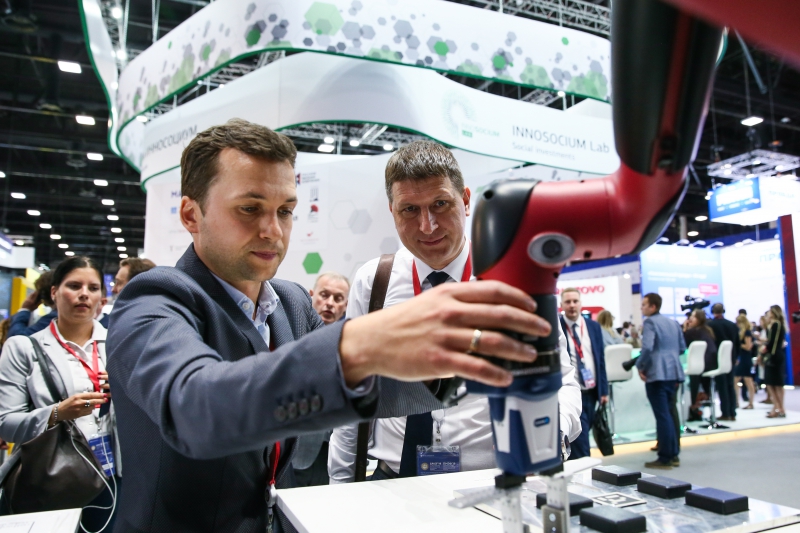
On the whole, our students can already design and implement innovations while following their Master’s programs. We have a transfer office at the Faculty which offers support in securing intellectual property rights, launching small innovative enterprises and acquiring licences for new companies. Up to this date, over 40 small innovative enterprises have been launched, and we can already speak of their success. For instance, the Quantum Communications small innovative enterprise has already attracted 100 million rubles of investments.
You mentioned an opportunity to do internships at major companies. Which industrial partners do you work with as part of your Master's programs?
We aspire to offer a very wide range of partners for the student to choose from. Therefore, among them are both major enterprises, medium and small businesses, consultants and public corporations. If I were to give you examples, that would be Yandex, Gazprom Neft, VKontakte, Baltika Breweries, and many more. It is important that our students have a wide choice of not just particular partners, but also a choice of different types of partners and future career opportunities.
Where can the program’s graduates develop their competencies? For what positions will they be sought-after?
First of all, they can become entrepreneurs. Our country experiences a lack of such specialists. If it’s the ecosystem of the country’s technological development that we’re talking about, we need people who can bring a technology that is currently on the stage of a university invention to the level of serious project, a successful business.
Secondly, they can become managers at major corporations, who are responsible for the matters of innovation. Major companies are currently offering more and more of such positions, and they are well-paid. This is an ambitious career choice for serious professionals who possess a full pool of competencies that I’ve already mentioned: knowledge of fundamental technologies, regulation issues, and other skills.
Thirdly, they can become professionals in a particular field. For instance, professionals in the field of managing state economy, specialists in the field of intellectual property, marketing, quality control at an enterprise and so on. These are all well-paid and sought-after jobs. What’s also important is that such specialists have to possess a keen knowledge of the field that they’re working in. For example, as an investor, I prefer it when a patent attorney has an education in chemistry or biology. This is a high level of professionalism that we aim to give our Master’s students.
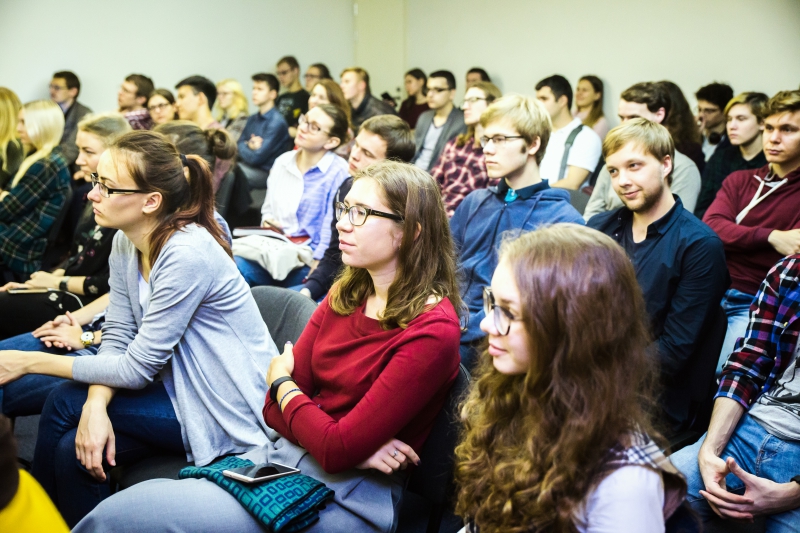
The fourth way is to become venture investment specialists. Such specialists can also make investment decisions at corporations.
To stress the point, all of these occupations are ambitious and well-paid. Moreover, they will all be highly relevant in the coming decades.
What are the possible ways of enrolling in a Master’s program at the Faculty of Technological Management and Innovations?
We deem it very important to work with people of different ages. Besides young specialists who have just completed their Bachelor’s programs, many accomplished professionals also aspire to study at our Faculty.
As a rule, these are the people who have already accomplished a lot. Many of them are looking to make changes to, or completely change their career paths. For such applicants, we offer a great opportunity to join a program via the Portfolio Contest. This is similar to an interview at a modern technological company: you describe your professional and academic experience in your portfolio, and your future mentors and lecturers meet with you and make the decision on your enrollment.
This is an option that we recommend to everyone who’s already forgotten how to take exams. Still, it’s also a good option for those who’ve just completed their Bachelor’s programs. By June 20, such applicants will already know whether they’ve been enrolled or not, and they will have two months before the start of their programs to prepare and consider their business ideas.
The second option is a classic exam, which you can take on-site or remotely.



